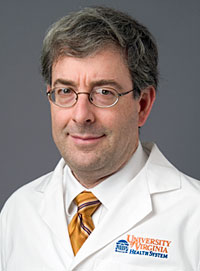February is National Heart Month. In addition to sharing your heart with your valentine, you should also take some time this month to learn more about the importance of having a healthy heart.
This entire month is dedicated to raising awareness about heart disease and prevention. Heart disease is the leading cause of death in the United States for both men and women. Heart attacks are one of several problems that can result from heart disease.
What can you do to reduce your chances of having a heart attack? What causes them? How can you recover from a heart attack? Lawrence Gimple, MD, from UVA Heart & Vascular Center answers these common questions and more.
What are the top risk factors for men?

The top reversible risk factor in men is cigarette smoking or use of tobacco in other forms. If you smoke, quit, and also avoid second-hand cigarette smoke.
Other risk factors include a positive family history of coronary heart disease, hypertension (high blood pressure), diabetes, high cholesterol levels and advancing age.
If you have previously had a heart attack or have coronary heart disease, renal failure, or other vascular diseases — such as blockages of the arteries in the legs, kidneys, or neck — then you are also at an increased risk of having a heart attack.
What causes a heart attack?
The underlying problem in most patients is a condition known as coronary atherosclerosis, sometimes known as hardening of the arteries. Patients with coronary atherosclerosis are predisposed to developing blood clots in the arteries of the heart that can block blood flow and cause heart muscle cells to die. When blood flow to the heart muscle is interrupted, a heart attack occurs. Heart attacks can be complicated by dangerous heart rhythms, low blood pressure, problems with oxygen in the blood, and even cardiac arrest.
What are some of the best preventive measures to take?
Many heart attacks are completely preventable. You should avoid using tobacco in all of its forms, especially cigarettes. It’s important to be active, exercise and to maintain a healthy lifestyle. Walking is the best form of exercise for most people, although all safe forms of physical activity are good for the heart. It is important to enjoy being active so that it becomes one of your long-term priorities.
A heart-healthy diet can be very worthwhile, especially when you avoid excessive calories, fried foods and overly processed foods. Scientific studies have shown that the Mediterranean diet is particularly healthy because it’s rich in vegetables, fruits, nuts and vegetable oils.
Controlling your blood pressure and blood cholesterol, while treating and avoiding diabetes, is also very important in preventing heart attacks.
What are the key warning signs and symptoms for heart attacks in men?
Some patients who are developing a heart attack will have obvious symptoms such as pressure or pain in the chest that radiates to the arms, especially the left arm, or to the neck and back. Some patients will mistakenly associate these symptoms with indigestion, especially if they experience nausea and vomiting. Others will have more subtle symptoms such as chest fullness, nausea, or severe sweats. Some patients will primarily experience shortness of breath.
In any of these situations, if you suspect that you may be experiencing a heart attack please call 911 and seek medical attention immediately.
What services does UVA Heart & Vascular Center offer to prevent and treat heart attacks?
UVA Heart and Vascular Center offers the most comprehensive, advanced, caring, and trusted treatment for heart attack patients in the region. UVA also supports patients before, during, and after a heart attack.
Cardiac rehabilitation can be very helpful to patients who want to assume a healthier lifestyle. UVA physicians focus on prevention of heart disease, both through active treatment programs and by providing access to clinical trials for patients with unusual or difficult medical conditions.
UVA pioneered many of today’s treatments for heart attacks and continues to provide leading-edge care to patients during their recovery. Services include:
- Non-invasive imaging
- Cholesterol and blood pressure management
- Heart catheterization with stenting during acute heart attack
How does UVA help a patient recover from a heart attack?
Recovering from a heart attack requires coordinated medical care, psychological support and ongoing access to exercise programs and lifestyle modification support. UVA’s advanced medical system offers all aspects of the needed medical care that might arise including, stenting, pacemakers, and advanced treatments. But most patients will need the softer support that comes from UVA’s outstanding cardiac rehabilitation program and outpatient clinics. By combining appropriate exercise, psychological support, and cardiac care, most patients with heart attack will do very well indeed.
For more information, check out the services provided by the UVA Heart & Vascular Center. If you would like to find out your risks or check on an existing condition, make an appointment or call 434.243.1000.
